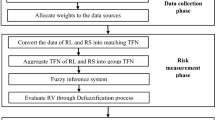Abstract
Risk is present everywhere, every area of life. In construction, the risk is always present. The Risk Assessment for Construction Industry is a complex task which requires the consideration of many parameters which are, difficult to quantify. Risk Assessment in the construction industry is unbridled with inadequate data and incomplete information, particularly in the early stage, for which traditional risk approaches do not give adequate answers. The methodology selected for risk management is, distributing a questionnaire to the various contractors’, Engineers and construction consultants. A detailed study is performed to conduct a risk assessment by incorporating Mamdani’s “Fuzzy Inference system” for better understanding and evaluation of construction risks.
Access this chapter
Tax calculation will be finalised at checkout
Purchases are for personal use only
Similar content being viewed by others
References
Akhil RP, Das BB (2018) Cost reduction techniques on MEP projects. In: Select proceedings of ICSCBM 2018, Springer Nature Singapore Pte Ltd. 2019, pp 495–517
Reddy CP, Das BB (2018) Methods to monitor resources and logistic planning at project sites. In: Select proceedings of ICSCBM 2018, Springer Nature Singapore Pte Ltd. 2019, pp 793–802
Pandey A, Chaudhary PK, Das BB (2019) Productivity analysis of shuttering works for sewage treatment plant. In: Select proceedings of TMSF 2019, Springer Publications Pte. Ltd. 2021
Hegde AL, Jain A, Das BB (2019) Resource buffers in construction projects. In: Select proceedings of TMSF 2019, Springer Publications Pte. Ltd. 2021
Paul B, Tondihal S, Das BB (2019) Safety stock in inventory management and wastage analysis at construction sites. In: Select proceedings of TMSF 2019, Springer Publications Pte. Ltd. 2021
Upadhya PR, Das MS, Das BB (2019) Multi criteria decision making approach for selecting a bridge superstructure construction method. In: Select proceedings of TMSF 2019, Springer Publications Pte. Ltd. 2021
Shekhar S, Shukla P, Das BB (2019) Developing a standard template for activity linkage and resource estimation of MEP works. In: Select proceedings of TMSF 2019, Springer Publications Pte. Ltd. 2021
Keshk AM, Ibrahim M, Annany Y (2018) Special studies in management of construction project risks, risk concept, plan building, risk quantitative and qualitative analysis, risk response strategies. Alexandria Eng J 57(4):3179–3187
Nieto-Morote A, Ruz-Vila F (2011) A fuzzy approach to construction project risk assessment. Int J Project Manage 29(2):220–231
Shojaei P, Amin S, Haeri S (2019) Development of supply chain risk management approaches for construction projects: a grounded theory approach. Comput Indus Eng 128:837–850
Nabawy M, Khodeir LM (2020) A systematic review of quantitative risk analysis in construction of mega projects. Ain Shams Eng J, In press
Samantra C, Datta S, Mahapatra SS (2017) Fuzzy based risk assessment module for metropolitan construction project: an empirical study. Eng Appl Artifi Intell 65:449–464
Dikmen I, Birgonul MT, Han S (2007) Using fuzzy risk assessment to rate cost overrun risk in international construction projects. Int J Project Manage 25(5):494–505
Raeihagh H, Behbahaninia A, Aleagha MM (2020) Risk assessment of sour gas inter-phase onshore pipeline using ANN and fuzzy inference system-case study: the south pars gas field. J Loss Prevent Process Indus 68:104238
Michael C, Costa Y, Pishvaee MS, Castro RC (2021) A fuzzy inference based scenario building in two-stage optimization framework for sustainable recycling supply chain redesign. Expert Syst Appl 165:113906
Wu W, Cheng G, Hu H, Zhou Q (2013) Risk analysis of corrosion failures of equipment in refining and petrochemical plants based on fuzzy set theory. Eng Failure Anal 32:23–24
Author information
Authors and Affiliations
Editor information
Editors and Affiliations
Rights and permissions
Copyright information
© 2022 The Author(s), under exclusive license to Springer Nature Singapore Pte Ltd.
About this chapter
Cite this chapter
Bhowmik, P., Udgata, G., Trivedi, S. (2022). Risk Assessment in Construction Industry Using a Fuzzy Logic. In: Das, B.B., Gomez, C.P., Mohapatra, B.G. (eds) Recent Developments in Sustainable Infrastructure (ICRDSI-2020)—Structure and Construction Management. Lecture Notes in Civil Engineering, vol 221. Springer, Singapore. https://doi.org/10.1007/978-981-16-8433-3_44
Download citation
DOI: https://doi.org/10.1007/978-981-16-8433-3_44
Published:
Publisher Name: Springer, Singapore
Print ISBN: 978-981-16-8432-6
Online ISBN: 978-981-16-8433-3
eBook Packages: EngineeringEngineering (R0)




